- Home
- Jay Bonansinga
The Sleep Police Page 13
The Sleep Police Read online
Page 13
“Excuse me, Doc,” Frank interrupted, aiming the gun at the three men. “If you don’t mind, I need to ask some questions of my own.”
Another tense pause. The swaying movement of the van, the rush of the rain of the roof. Curless and Goodwell eyeing the Ithaca.
“Go ahead,” Pope said. “Whoever you are.”
Frank took a step closer to Pope, raising the barrel to eye level. “One question, Doc.”
“Go ahead.”
“How did you know about the ‘God’s work’ reference?”
In the darkness, Pope stared for a moment. “How did I know about what?”
Frank’s spinal column was buzzing with nervous energy. “The reference on the video, the videotape, the alter saying he was doing God’s work. How did you know about that?”
“What are you talking about?”
“I never told you about that part,” Frank said.
“Yes, you—”
“No, no! I never told you about that.” Frank’s knuckles were white around the shotgun. “I never mentioned the God’s work part, and I never showed the tape to anyone. Not a soul. Nobody saw that tape.”
“Frank—”
“And yet, and yet! You knew about the ‘God’s work’ thing. How is that possible?”
Another stretch of silence, the tension pressing down on dark interior of the van like a gigantic vice. Frank’s gaze was fixed on the elderly doctor. The rain was strafing the metal shell of the van, and both Curless and Goodwell were mere seconds away from doing something.
“Frank listen to me,” the psychiatrist said. “This is your alter personality talking.”
“Shut up!”
“Frank—”
“SHUT—!
Frank saw the sudden movement out of the corner of his eye, but he had very little time to react as Goodwell went for his midsection, and Curless made a desperate attempt to grab at the shotgun.
The impact drove Frank off his feet, sending all three men sprawling to the floor.
And the shotgun discharged, roaring silver-magnesium sunlight in the dark van.
CHAPTER TWENTY-ONE
The blast went high, chewing a saucer-sized hole in the ceiling, a puff of metal fragments, vinyl stuffing and grit filling the darkness.
The van swerved, Briggs reflexively jerking at the gunfire, the g-forces tossing all the passengers against the opposite wall. Frank’s shoulder clipped the edge of the bench, and then he went down hard in the corner, but he managed to hold onto the shotgun. Pain exploded in his lower back. The sound of screeching tires pierced the chaos.
Frank managed to sit up, the shotgun still clutched in his sweaty grasp.
The van skidded to a halt.
“STAY DOWN!!” Frank howled at them, struggling back to his feet.
The men in the rear were still on the floor. Dazed. Breathing hard. One by one, they showed their hands. Outside, thunder boomed as if answering the pandemonium. Frank could hear the squad car screeching to a halt in front of the van, the sound of the car’s engine revving wildly.
“STAY ON THE FLOOR!” Frank bellowed. “HANDS INTERLACED BEHIND YOUR NECKS!” He glanced into the cab, and saw Briggs going for his gun. “DON’T DO IT, BRIGGS! TOSS THE SMITH ON THE FLOOR MAT! NOW! TOSS IT ON THE MAT!!”
Briggs did as he was told.
“Hands behind your neck!” Frank hollered at Briggs, his voice hoarse from all the screaming.
There were more noises crackling outside in the thunder and the rain. Radio voices, the sounds of car doors clicking open. Frank tried to focus. Frank tried to put the brakes on his racing thoughts, but his mind was a whirlwind of information streaming into him.
Should Frank go back and recant his confession? Did he have enough evidence to convince anybody? Did he have any evidence at all? Sure, Pope couldn’t have possibly known about that “God’s work” reference, but what did that prove? That Pope had something to do with the tape? It was still Frank’s face on the videotape. Frank’s fingerprints at the scene. Frank’s shoe prints, Frank’s cigarettes, Frank’s handwriting. And what about those psychological files at Pope’s office? If Frank turned himself in now—with his brain a whirlwind of conflicting emotions—they’d throw him in the booby hatch for sure, no questions asked.
“Don’t do this, Frank, don’t make it worse,” Curless was imploring from across the darkness of the van, lying prone on the floor.
Thunder rumbled outside, lightning flickering.
“That’s not Frank anymore,” Pope said softly, lying next to Curless.
Frank pumped the Ithaca, the slide clanging loudly. “I’m asking you guys for the last time to be quiet!”
A sudden bolt of dread shot through Frank’s brain, so powerful it felt as though he had been electrocuted. It nearly knocked him off his feet. What if Pope were correct? What if Frank had missed some kind of switch being thrown inside him? What if he were actually somebody else right now? He certainly had never behaved this way in his life. At least not consciously. But underlying all this doubt was a raging furnace of conviction that he was innocent. All Frank had to do was start tugging on the loose thread that Pope had accidentally revealed. But he needed time. He needed time to get his thoughts together, build a case for himself.
“Curless?! Briggs?! You all right?!”
An amplified voice was shaking Frank out of his stupor. It came from the front, and Frank shuffled forward, toward the cab, peering out the waffled metal screen.
Outside, the sheets of rain were billowing down through the blue rhythmic flashes of the squad car. In the distance beyond it, taillights were receding into the mist, the street fairly deserted.
The two uniformed cops were outside their squad car, flanking each side, crouched behind open doors. Evidently, they couldn’t see Briggs behind the van’s wet, tinted windshield. One of the uniforms was gripping a hand mike, his voice trumpeting through the beat car’s PA system.
“Curless? Briggs? Acknowledge! You got a ten-thirty-three in there or what?!”
Frank’s sphincter muscle tightened.
From the back, Curless’s voice: “They’ve already called this thing in, Frank. Come on. Where you gonna go?”
“Listen to him, Frank, he’s telling you the truth,” Pope said.
“Quiet! Please—!”
“Your name’s not Frank, is it?”
“Shut up! Shut up—!”
Noises were coming around the sides of the van now, shuffling footsteps in the rain. Thunder tore open a crack in the sky, the lightning turning the van into a flickering nickelodeon. Frank was holding the gun on his hostages with trembling hands. That’s what they were now: hostages.
“Curless!” From outside, one of the uniforms was hollering over the rain. “Give us a ten-thirteen immediately! Or we’re coming in!”
Inside the van, Curless said, “Frank, I gotta tell them something.”
“Give them a standby!” Frank ordered.
“Frank—”
“Do it!”
“Johnny!” Curless shouted loudly, loud enough to penetrate the walls. “We got a hostage situation here—”
“God damn it, Curless!” Frank pointed the shotgun at the marshal. “That’s not what I asked you to—”
“Stand down, Johnny! You too, Carl!” Curless yelled. “We got a situation.”
“Damn it!” Frank hissed, turning away from the back door for a moment. His flesh was crawling. His synapses popping like firecrackers. He couldn’t breathe. He couldn’t think. He knew his time was running out. Half the CPD and a good chunk of the federal roll call would be outside this van in a matter of minutes.
“Frank?” Pope’s voice.
“Shut up! Shut up!” Frank shuffling back toward the front of the van, peering out at the storm like a restless panther in a cage.
“Frank, listen to me—”
“SHUT THE FUCK UP!” Frank shrieked at the psychiatrist, all the fear and rage bursting out of the top of his skull. Outside, thunder pea
led. Lightning strobed.
In the flickering light, Frank saw Pope’s gray face staring at him from the rear of the van. “You need sleep, Frank,” the doctor said.
Cold electricity ran down Frank’s spine. Goosebumps crawled down his arms. He flinched suddenly as a fractured image sparked in the back of his mind—
(—his own hand, slick with blood, gently closing the eyelids of a corpse—)
Frank staggered.
Thunder rumbled outside the van, the rain surging against the roof. Lightning flashed again, turning the dark cargo bay into a flicker-film. Frank was struggling to stay focused, keep his mind sharp.
From the back, Pope’s soft, gravelly voice: “You need sleep badly, Frank.”
Another jolt of electricity, sending fragments of broken images across Frank’s mind’s eye—
(—his blood-soaked hand scrawling something on a wall, words and letters written in deep scarlet—)
Frank flinched again, nearly dropping the shotgun. He shook his head violently as though shaking off toxic water, and he paced along the wall, breathing hard and fast. He could hear a siren in the distance, barely audible above the noise of the rain. He was trapped.
At last, he made a decision.
He whirled toward the front of the cab. “Get down, Briggs! Down on the floor!”
Briggs ducked, and Frank raised the shotgun at the waffled steel screen and pulled the trigger. The blast nearly jerked Frank’s shoulder out of its socket, singeing his arm hairs, deafening him. The shot punched a fist-sized hole in the screen, shattering part of the windshield in front of it. Frank’s ears were ringing again.
“Stay down, Briggs!” Frank yelled, pumping another shell into the breech, the plastic casing ejecting off across the floor.
From the back: “Frank! Don’t do it!—FRANK!”
From outside: “We’re coming in!”
Frank hollering over the noise: “Stay down—!”
He fired another round into the screen.
Silver light popped inside the darkness, the blast gobbling another huge chunk of screen, dirt and debris and metal frags blossoming in all directions. Another volley of thunder answered the gunfire, blinding flashes of lightning hot on its heels. The air started smelling of cordite.
Frank was completely deaf now, flash-blind and numb. He lurched toward the screen, smashed his shoe through the mangled metal and quickly climbed through the gap. Jagged edges tore at his hospital tunic as he slid down onto the passenger side of the front seat.
Briggs was going for his pistol.
“Don’t, Briggs, don’t do it!” Frank said, twisting around and shoving the barrel of the Ithaca in Briggs’s face. Point blank. Breathing each other’s breath. Frank pumped another shell into the Ithaca.
In the rear, the sound of the doors bursting open.
Curless’s voice: “He’s going out the front!—the front!—THE FRONT!”
Frank scooped up Briggs’s .357, opened the passenger door and slipped out.
Rain lashed at him, spit in his face as he staggered across the wet pavement, hurrying around the front of the van, vapor lights in his eye, ears ringing. The night opened up around him like a vast dark throat. In the distance, sirens were singing out of tune. The air smelled of burning chemicals. The cold spray in Frank’s face was bracing, and it woke him up, and it made him sharp, and it made him hurry.
He could hear the uniforms coming around the back of the van.
“HOLD IT FRANK!!” One of the uniforms was hollering over the thunder.
One chance. Frank had one chance, and he took it.
“STOP RIGHT THERE!”
A warning shot boomed up into the sky, the echo bouncing off distant tenements.
Frank was rushing around the driver’s side of the idling squad car—both doors still gaping. He lunged behind the wheel, head spinning, vision blurred, lungs heaving for air, heart hammering. The uniforms were fifteen feet behind him. Two silhouettes in the van’s headlights. Crouching down, both in the tripod position, taking aim.
Frank floored the accelerator.
The squad car shimmied for a moment, engine screaming, rear wheels hydroplaning.
The first shot barked out behind him, a dry-husk pop in the wet air, the blast piercing the rear window, a spray of glass filling the squad car. Frank instinctively ducked, and he saw the chunk in the dash only inches away, over the glove compartment. The bullet had chiseled through to the metal.
Then the wheels found purchase, and the squad car surged into the rain.
More shots rang out in the receding darkness behind him, tiny blossoms of light in the curtains of rain. But none of them landed. The squad car’s large-block V-8 engine was gobbling the road, the four hundred horses going berserk, slamming the doors and pinning Frank against the seat.
For years Frank had commandeered one of these patrol boats, and in a lightning flash, it was all coming back to him. He reached the next light in a heartbeat and turned west on Eleventh, glancing up at his rearview for any signs of pursuit. He expected to see the van coming around the corner any second now.
But nothing appeared in the mirror.
By the time he reached South State, he was thinking clearly enough to put on his emergency lights. From there, he turned south and drove deeper into the Loop, catching his breath and organizing his thoughts. If he could only block out those images lingering like flashbulb spots burned onto his retinas. Images of his own hand, covered with blood, finger-painting words on a wall. Writing in blood.
He was a hunted man now, and there was much to do. He would have to be careful if he was going to prove his innocence. In fact, he would have to be more than careful; he would have to be lucky.
He would have to survive impossible odds.
By the time he reached Eighteenth Street, he was already making plans.
CHAPTER TWENTY-TWO
Frankie is eleven years old and bundled in his Bradley Braves sweatshirt, his snowsuit, his insulated boots and ski mask. It’s a brutally cold, starry winter’s night, and Frankie sits on the passenger side of his Aunt Nikki’s 1970 Pontiac Tempest station wagon, staring out the ragged holes of his mask at the desolate, snow-encrusted farms of Central Illinois. They are heading north on Highway 55 toward Bloomington. The moon is high and thin in the ink-black sky, a cold cut diamond shining down on the barren fields, and Aunt Nikki is singing a Chris Montez song over the whir of the defroster while she drives.
“The more I see you, the more I want you,” she warbles in her cracked falsetto. She glances over at Frankie. “Come on, honey, sing with your Aunt Nikki.”
Frankie refuses to sing, and he refuses to take his ski mask off. There’s something comforting and protective about the mask, even though it’s making Frankie sweat, and it smells like wet dog fur against his nose. It’s a small price to pay to be invisible. Which is exactly what Frankie wants to be at the moment. In fact it is exactly what he has wanted to be ever since his mother was sent away to the funny farm.
“Somehow this feeee-linnnng,” Aunt Nikki goes on crooning, “Just grows and groooooows.”
Frankie slumps down lower into the back seat, pretending to be asleep. He doesn’t want to hurt Aunt Nikki’s feelings. Aunt Nikki is not a bad woman. There’s even something sad about her— that round face always squinched by the nylon scarf, and that hairy mole right on the end of her nose, and the smell of day-old talc always hovering around her. And besides, Frankie is not a confrontational boy. He doesn’t even like to argue with his brother Kyle. He just wants to stay to himself and read his Homer Price Mystery books and pretend he’s somebody other than a skinny little Greek kid with a nutcase for a mother.
“Almost there!” Aunt Nikki announces when they pass a green mileage sign.
They’re on their way to see Bradley University play at Illinois State. Frankie loves basketball, and since Nikki works part time in the Bradley cafeteria, she has two free tickets. A few minutes ago, they dropped Kyle off at a neighboring farm
while Uncle Andreas stayed home to rest. On paper, the whole trip seemed like a good idea, but now that Frankie was alone with his thoughts and the desolate passing landscape—not to mention Aunt Nikki’s singing—it’s turning out to be not so good an idea after all.
Another sign looms in the headlights.
“Your Aunt Nikki has to pee-pee,” says Aunt Nikki, noticing the Stuckey’s Truck Stop billboard, turning her blinker on. “We’ll take a quick pit stop.”
They zoom down the icy ramp, and make their way into the crowded parking lot.
“You want to come in, honey?” Aunt Nikki asks after pulling into a parking place.
Frankie peers up at her through ragged holes in his ski mask. “Um... I don’t know.”
“Do you have to tinkle?”
Frankie shakes his head.
“Okay... you wait here, I’ll just be a second. I’ll leave the car running.”
She gets out and waddles across the brittle layer of dirty ice and into the truck stop.
Frankie waits.
And waits.
And waits.
And after a while, he gets bored, leans over the front seat and turns on the radio. And he waits some more. And he starts to wonder what happened to Aunt Nikki. Did she fall in? That’s what his mother used to say when Frankie would take too long in the bathroom. Did you fall in, Frankie? Right then, Frankie pictures his Aunt Nikki in a comical mishap, falling head first into the toilet, her legs sprouting out the top, scissoring back and forth.
“Jeez Louise,” Frankie mutters under his breath, finally opening his door.
The frigid wind curls around his head as he climbs out into the night. The sweat-damp ski mask freezes instantly, and his boots crunch through the ice as he trundles across the parking lot toward the truck stop entrance.
He goes inside.
It smells like a party in there—cigarette smoke, spilled beer and grease frying. Boisterous laughter, the cha-ching of a cash register. Frankie immediately feels uncomfortable. All the noise and smells and strangers. He walks along the counter, past all the butt cracks and shopworn cowboy boots and grizzled old truckers nursing brown bottles. Nobody notices him. Nobody gives a whit.

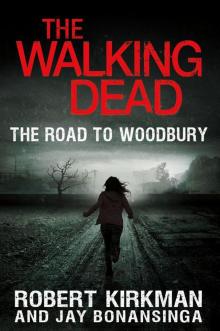 The Walking Dead: The Road to Woodbury
The Walking Dead: The Road to Woodbury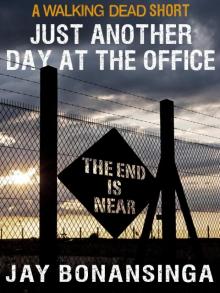 Just Another Day at the Office
Just Another Day at the Office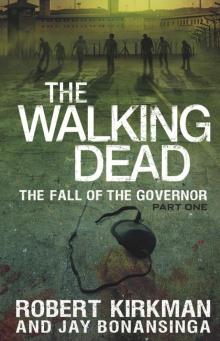 The Fall of the Governor: Part One
The Fall of the Governor: Part One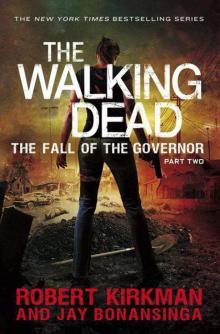 The Walking Dead: The Fall of the Governor: Part Two
The Walking Dead: The Fall of the Governor: Part Two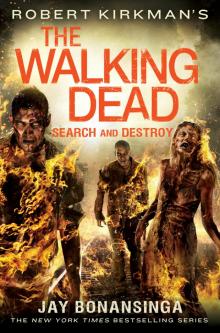 Search and Destroy
Search and Destroy Invasion
Invasion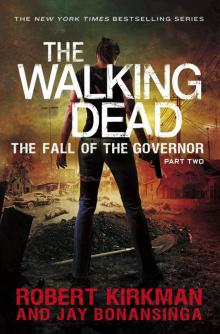 The Fall of the Governor: Part Two
The Fall of the Governor: Part Two The Walking Dead Collection
The Walking Dead Collection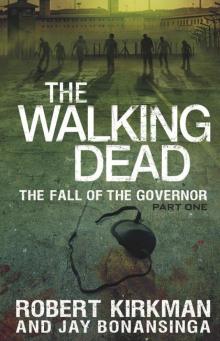 The Walking Dead
The Walking Dead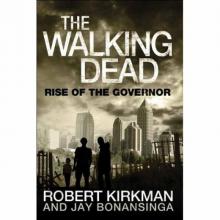 Descent
Descent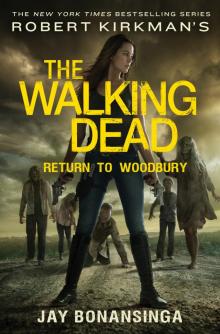 The Walking Dead: Return to Woodbury
The Walking Dead: Return to Woodbury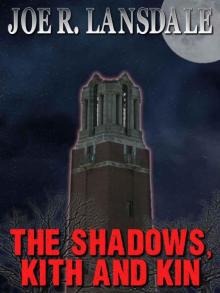 The Killer's Game
The Killer's Game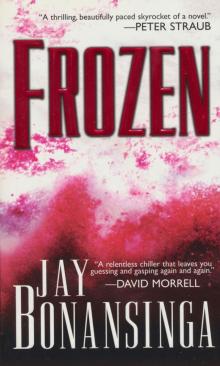 Frozen
Frozen Shattered
Shattered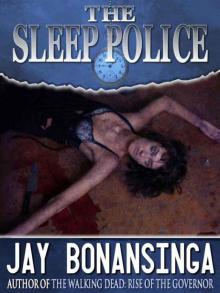 The Sleep Police
The Sleep Police Perfect Victim
Perfect Victim